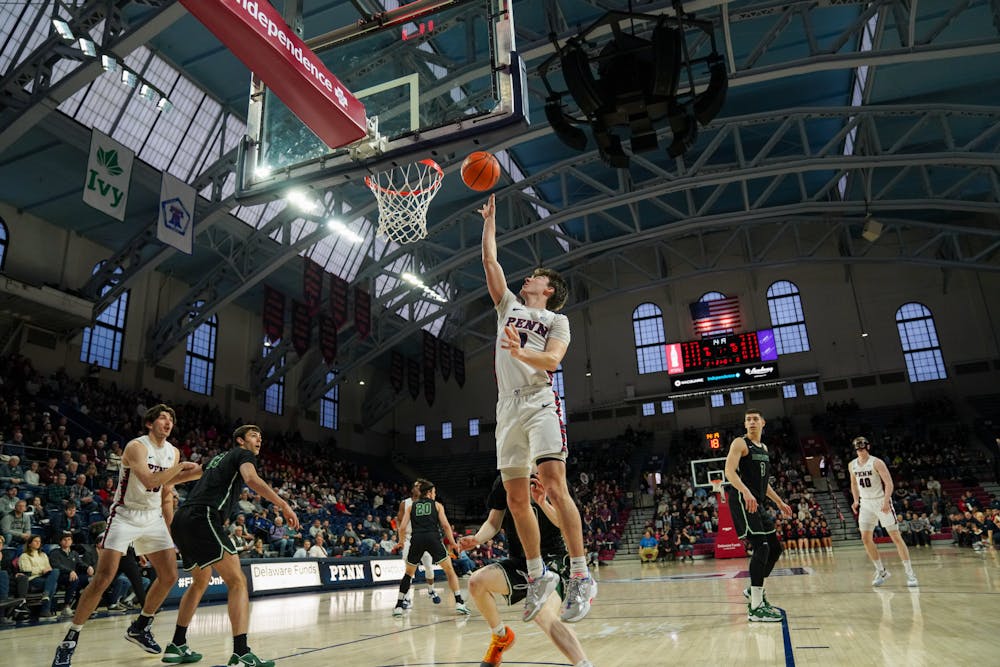A new year, a new dawn of Ivy League play.
Penn men’s basketball (9-7, 1-0 Ivy) started off its 2024 Ivy campaign just the way it wanted to: in the win column. An explosive first half and consistent second half allowed the team to demolish Dartmouth (4-10, 0-1) with a final score of 51-80.
For the second straight game, the Quakers missed their senior guard Clark Slajchert, who has been a major offensive focal point this season. But you could not tell the Quakers were missing their leading scorer by the way they played today.
“Before the game I had some nerves, about the scout, how close it is, but at the end of the day it was just basketball and were able to get it done,” freshman guard Tyler Perkins said. “And everybody stepped it up. And it was huge for us and showed that we can all play.”
And everybody did step up.
Freshman Niklas Polonowski proves he is a three-point threat with 60% shooting off five attempts. Role players like junior guard Reese McMullen and senior guard Andrew Laczkowski each contributed 10 points in the absence of Slajchert, with McMullen nailing two threes. Laczkowski, who made his first career home start today, continues to be a hustle player for Penn, grabbing six boards – three of which were off the offensive glass.
“Just to make those plays for our team because at the end of the day we don’t decide how games are won,” Laczkowski said. “We just have to make plays and those plays help us win those games.”
The three-point line became Penn’s best friend in the first half. The team shot an incredible 71% from beyond the arc for a total of 30 points. Seven of those first half attempts came from Perkins, who nailed five to contribute to a first half total of 19 points.
RELATED:
Penn men’s basketball overmatched by No. 25 Auburn in 88-68 loss
Smothering defense leads No. 3 Houston to 81-42 rout of Penn men's basketball
“They protected the lane, not that they dared to shoot but they go under screens and if you can hurt them, that’s where you hurt them,” coach Steve Donahue said of their three-point shooting. “If we can get ten threes and less than ten turnovers and hold the opponent to less than 10 offensive rebounds, you win like 99% of your games.”
Contentlatter minutes of the first half, the Quakers made 13 of their last 15 field goal attempts, which contributed to a huge first half lead. They led by as much as 29 in the opening 20 minutes and finished with a 24-47 lead going into halftime.
Penn’s lights-out shooting also stemmed from its ball movement. Whether it was a good pass to the interior off a cut or junior center Nick Spinoso finding the open man in the midst of a post-up, the players made all the right moves and capitalized each time.
The Quakers’ play on the defensive end was similarly excellent. They were a nightmare for the Big Green, who gave up sloppy turnovers on its offensive end. Junior guard Ryan Cornish and sophomore forward Jayden Williams tried to get something going for the Big Green with seven and eight points apiece in the first half, but the Quakers smothered them on the interior, keeping them from getting easy shots and forcing either tough shots, turnovers, or shot clock violations.
Dartmouth started off the second half with a turnover, but it was much more aggressive, coming in with a full court press and increasing the number of attempts in the interior to draw fouls. And while Penn had great ball movement and open looks in the paint to start the second half, Dartmouth challenged the Red and Blue on every shot to deny easy points. The Big Green's aggressive start versus Penn’s slow offensive start led to a 9-3 run, cutting the deficit to 17. Penn meanwhile went 2-11 from the field in the first five minutes of the half.
“I thought there were times where the offense came to a grind a little bit. We probably overdribbled it. The [Ivy] League [doesn’t] give you the initial shot sometimes so you have to keep playing through another action. We didn’t do that as well as we hoped,” Donahue said of the team's second half performance.
The second half did not feature the same three-point attack the Quakers had in the first half. Their attempts were limited by tighter coverage by the Big Green. So, the Quakers turned more toward attacking in the paint, giving way for more cuts and drives to the basket. They still got open looks from three, finishing with 12 points from downtown in the second half, but the pace was noticeably slower.
While it was a tale of two halves in terms of offensive emphasis for Penn, one attribute prevailed in each half: dominance. When Dartmouth took away its three-point shot, Penn adjusted and did not surrender its lead at all.
Penn will need another stellar offensive performance in the coming games as the Ivy League gauntlet starts up. The team travels to Ithaca on Jan. 15 for its next matchup against Cornell.









